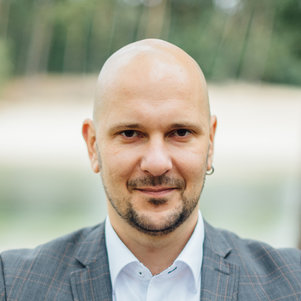
Prof. Dr. Evgeny Pidko
- +31 1527 81938
- e.a.pidko@tudelft.nl
-
Full Professor
Inorganic Systems Engineering
TU Delft / Faculty of Applied Sciences
Department of Chemical Engineering
Building 58 – Room E2.020
Van der Maasweg 9
2629 HZ Delft
Evgeny (Moscow, Russia, 1982) was trained as a researcher in the group of Prof. Vladimir Kazansky at Zelinsky Institute of Organic Chemistry of the Russian Academy of Science, where he had been working as a student research assistant in 2000-2005. He received his MSc degree from the Higher Chemical College of the Russian Academy of Sciences in Summer 2004. Shortly afterwards, in January 2005, he arrived to the Netherlands to join the group of Prof. Rutger van Santen at Eindhoven University of Technology, where he learned the art of computational catalysis. After defending his PhD on reactivity of cation-exchanged zeolites in March 2008, he decided to stay in Eindhoven as a postdoc with Prof. Emiel Hensen and Prof. Rutger van Santen. In this position, he got an opportunity to initiate a new research line in theory of biomass conversion within the CatchBio consortium. In 2010 he received a personal NWO-STW VENI grant and in 2011 got appointed Assistant Professor of Catalysis for Sustainable Chemistry within the Inorganic Materials Chemistry group at TU Eindhoven chaired by Prof. Emiel Hensen. In summer 2012, he spent several months in the group of Prof. C. Copéret at ETH Zürich to learn the magic of synthetic organometallic chemistry. In 2016 he received an ITMO Professorship award that allowed him to become a part-time professor and a head of the theoretical chemistry group at ITMO University, St. Petersburg, Russia. In 2016 he was awarded an ERC Consolidator grant for a project on theory of catalyst deactivation in selective hydrogenation processes.
In September 2017, he joined Delft University of Technology as an associate professor; and in 2020 he was appointed Full Professor and head of the Inorganic Systems Engineering group at the Chemical Engineering Department of TU Delft. Evgeny Pidko serves as a member of the advisory boards of ChemCatChem and Catal. Sci. Technol. journals, and a member of the editorial board of the Review Journal of Chemistry and Mendeleev Communications.
Evgeny is a physical (inorganic) chemist by training and an active member of the (broad) catalysis community. He is interested in understanding complex reaction networks underlying chemical processes in solution and at interfaces and developing new tools for analyzing such networks and providing guidelines for the experimental studies. He finds particularly exciting such subjects as the selective catalytic hydrogenation, zeolite catalysis, mechanisms of catalytic reactions, organometallic and inorganic functional materials. Besides science and education, he enjoys modern art, humor, quality music, and his family. He is married to Dr. Svetlana Sviridenko and they have a son and a daughter.